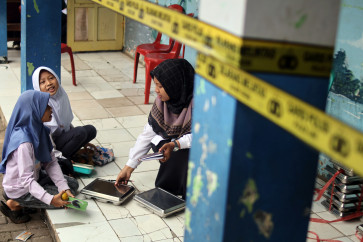Popular Reads
Top Results
Can't find what you're looking for?
View all search resultsPopular Reads
Top Results
Can't find what you're looking for?
View all search resultsParties still discriminating against women, says study
Despite numerous rules and regulations requiring political parties to promote gender equality, a recent study by the University of Indonesia has found that parties in the country have continued with discriminatory policies against women
Change text size
Gift Premium Articles
to Anyone
D
espite numerous rules and regulations requiring political parties to promote gender equality, a recent study by the University of Indonesia has found that parties in the country have continued with discriminatory policies against women.
The study found that gender equality remained a non-issue for the country’s major political parties.
Reports from the study entitled “Political parties and half-hearted gender strategies” said that the three major political parties surveyed — the Democratic Party, the Golkar Party and the Indonesian Democratic Party of Struggle (PDI-P) — deliberately slighted the interests of women in politics.
The authors of the report, Ani W Soetjipto and Shelly Adelina said that the three major political parties only accommodated demands for gender equality by setting up an ad-hoc department or division to deal with women’s issues.
The 2002 Election Law requires that women make up 30 percent of each political party’s legislative candidates and that in order to meet that objective, political parties must set up departments to empower their female members.
The ruling Democratic Party has created a women empowerment department while the Golkar Party has set up a Caucus for Women (KPPG). The PDI-P has a similar creation — the women and children empowerment department.
The study, however, found that despite the presence of such departments, gender equality issues remained on the back burner, with women rarely finding themselves in decision-making positions.
It also found that high ranking officials in three major political parties had a superficial understanding of gender issues.
“These people think that gender issues are simply the result of differences of sex, the function of a division between male and female. They fail to see that gender is a social construction that can give rise to many problems,” Ani said.
Syamsuddin Haris, a senior political analyst with the Indonesian Institute of Science (LIPI) reaffirmed the survey findings, saying that none of the major political parties in the country had a clear platform on how to empower women.
“All they have is a blurry mix of ideas,” he said.
Syamsuddin said most political parties tended to accommodate demands from society that adopted a mainstream, patriarchal way of thinking, with politicians drafting regulations discriminating against women as a result.
As of August 2012, the National Commission on Violence against Women recorded that there were 282 bylaws that victimized women, including some that detailed the way women should dress.
Burhanuddin Muhtadi, political analyst with the Indonesian Survey Institute (LSI) said that parties were motivated by votes and would do just about anything to win elections even if it meant trumping the rights of women.
Burhanuddin also blamed female voters for not having enough understanding on women’s issues.
“The government and political parties themselves need to educate female voters about the importance of gender issues,” he said.
A survey released by LIPI late last month found that local values impeded women’s progression and participation in the country’s politics.
In Nanggroe Aceh Darussalam, for instance, women were found to be discouraged from entering politics and becoming community leaders because of local conservative Islamic values.
Aceh is one of the provinces with the lowest number of women at the local council level, with only four out of 69 council members being women.










